Enter content here Daily Telegraph IMRO worried. Standart Valentin Kitanov, deputy leader of Bulgaria's Internal
Macedonian Revolutionary Organization, tells "Standart News" that a war is being waged in dangerous proximity to the Bulgarian border.
Ethnic Albanian extremists are trying to fan an ethnic conflict in Macedonia, Kitanov says. If these attempts prove successful, the resulting conflict will be one of the most serious ones in the Balkans over the last ten years. Macedonia gives rebels 24 hours to leave territory. Reuters SKOPJE, March 20 (Reuters) - Macedonia on Tuesday gave ethnic Albanian rebels 24 hours to surrender or withdraw from its territory.
The ultimatum, signed by the interior and defense ministries, said Macedonian troops would not fire on rebel positions at the town of Tetovo from midnight on Tuesday to midnight on Wednesday unless attacked.
"After this deadline, Macedonian security forces will continue using all its means against positions of terrorists until they are completely destroyed," it said. Rugova: Foreign Countries Involved in Macedonian Conflict. --- Representatives of ethnic Albanians in Temporary Administrative Council of Kosovo (PAVK) concluded today that Government in Skoplje should begin fulfilling demands of ethnic Albanians in Macedonia. At today's session at which the newest developments in Macedonia were discussed, it was concluded that the situation could not be solved by violence. The Council denied their involvement in Macedonian conflict, while the president of Democratic Union of Kosovo, Ibrahim Rugova, accused Bulgaria of taking part in Macedonian internal affairs.
"We demand that NATO, UN Security Council, European Council and USA investigate Bulgarian involvement in arming (Macedonian) Armed Forces, but some other countries as well. If this is really true, it is very ugly," said Rugova. Coalition under strain. BBC Tuesday, 20 March, 2001, 11:15 GMT
By the BBC's south-east Europe analyst Gabriel Partos
The rebel Albanian campaign has put Macedonia's multi-ethnic coalition under severe strain.
The main Macedonian Slav opposition parties have been criticising Prime Minister Ljupco Georgievski's government for not doing enough to crush the guerrillas. 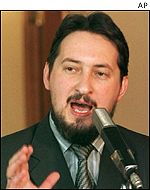 Criticised: Prime Minister Ljupco Georgievski
They believe Mr Georgievski has already conceded too much to the ethnic Albanians since his previously nationalist party, known as VMRO, formed a seemingly improbable marriage of convenience with Arben Xhaferi's once equally nationalist ethnic Albanian party two-and-a-half years ago.
According to the opposition Social Democratic Alliance, made up of former communists, Mr Georgievski gave in to ethnic Albanian demands in order to stay in power.
They say he wanted to secure the election of his party's candidate Boris Trajkovski, in the 1999 presidential elections.
Partners undermined
Meanwhile, Mr Xhaferi, whose party is an influential junior partner in the coalition government, has also come under attack from his own side.
His Democratic Party of Albanians (DPA) has been denounced by more militant forces for not achieving enough to improve the lot of Macedonia's ethnic Albanians.
They argue that one of the key achievements on the inter-ethnic front - the forthcoming opening of a university in Tetovo where Albanian will be the main language of teaching - does not go far enough because the university will be a private foundation, not a state-funded institution.
Until now, the governing coalition has held together remarkably well.
It weathered the massive inflow of Kosovar Albanian refugees during the Kosovo conflict in 1999 which some feared was going to upset Macedonia's precarious ethnic balance.
And it has survived the departure from power of a previously key coalition partner.
But the outbreak of fighting has created an entirely new situation.
Federation ruled out
The guerrilla campaign has produced a dilemma for Mr Xhaferi's party.
The party agrees with many of the fighters' demands for ending what they see as discrimination against ethnic Albanians, but it has also condemned the fighting.
Meanwhile, Mr Xhaferi told the BBC that he has now come out against the federalisation of Macedonia which would establish autonomy for ethnic Albanians in the western and northern part of the country:
"From the start my stance has been that the federalisation of Macedonia is against the interests of Albanians and I have never supported this idea.
"It is in the interest of all the Albanians for Macedonia to have a consensual democracy where some of the dilemmas in the society can be solved through consensual decisions."
Although the establishment of a federation is not an explicit demand made by the guerrillas, it is a policy that is expected to be on their agenda in the medium term.
And by pursuing this, and other objectives which many ethnic Albanians in Macedonia find attractive, the militants are putting pressure on Mr Xhaferi's party.
As a result, the DPA is torn between agreeing with some of the guerrillas' demands but opposing their use of force.
Xhaferi's dilemma
As a result of this ambivalent stand, Mr Xhaferi's party has been losing some of its influence.
On the other side of the ethnic divide, but also within the governing alliance, VMRO is under pressure from Macedonian public opinion.
Mr Xhaferi's coalition is looking increasingly beleaguered as the DPA has reiterated that it will not stay in government if a state of emergency is introduced.
One solution that has been hinted at is the possibility of a grand coalition bringing in some of the opposition parties.
But it is not clear whether they would want to find themselves saddled with responsibility for an increasingly serious political and security crisis. Who are the rebels? BBC Villagers in a cafe in Selce, Macedonia, where the NLA has its headquarters. Tuesday, 20 March, 2001, 22:54 GMT
By Balkans Correspondent Paul Wood
As the clashes in Macedonia take on the dimensions of an international crisis, the composition and intentions of the rebels have become the subject of anxious speculation in Western capitals.
To some, the National Liberation Army - the NLA, or UCK in Albanian - are a tiny group of fanatics who fought in Kosovo but who do not realise that their time has passed; to their supporters they are freedom fighters.
For a long time the authorities in Macedonia maintained that the NLA was the Kosovo Liberation Army, the KLA, disguised, or that they were fighters from another conflict, in Serbia's Presevo valley.
Either way, this was a problem being imported across the border.
Kosovo connection
I joined a rebel supply train as it made its way over the mountains from Kosovo and into its base in northern Macedonia.
The 30-40 fresh volunteers and two mules loaded with supplies, strung out like a line of ants, had evaded K-For helicopters to get this far. 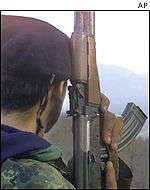 An ethnic-Albanian fighter looks over the Tetovo valley
The group took heavy incoming fire from the Macedonian security forces just inside the border before they made it through to their own lines.
The NLA is using Kosovo as a rear supply base and safe area and many, perhaps most, of its members did fight in Kosovo, in the KLA.
Home-grown movement
While there are some Kosovo-born volunteers in the NLA, almost every member I have spoken to says the group is composed overwhelmingly of Macedonian-born Albanians.
They say they are returning to their homeland to fight a long-planned-for "war of liberation".
One of the senior commanders, himself a veteran of the KLA, blamed the situation on "a decade of oppression by the Slav Macedonian government.
"We do not want to endanger the stability and the territorial integrity of Macedonia, but we will fight a guerrilla war until we have won our basic rights, until we are accepted as an equal people inside Macedonia."
Macedonia is not Kosovo.
Many ethnic Albanians in Macedonia complain of human rights abuses by the police, but, unlike in Kosovo, there have been no massacres by the security forces.
Macedonia also has a multi-ethnic coalition government in which the biggest ethnic Albanian political party is the junior partner.
It has always represented itself as a model of how different peoples could live together in peace.
I asked the senior NLA commander how he could justify killing policemen when there appeared to be political means of advancing the rights of his people.
He replied that the Albanians in the Macedonian Government were more concerned about keeping their well-paid jobs and exercising lucrative patronage than in the national interest of their people.
"These actions are designed to get the attention of the police and the government in Macedonia, to make them sit down and talk and solve the problem peacefully." 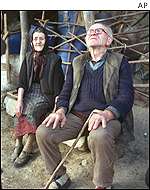 Ethnic Macedonians being told to leave their home in Lasce, Macedonia,
The commander set out a number of other aims which military action was supposed to achieve: Unbiased international mediation, international peacekeepers, including Americans and a new Macedonian constitution which would give greater autonomy to Albanian areas.
The remark about wishing to preserve the territorial integrity of Macedonia was the first manifestation of a carefully worked-out political strategy designed by the leadership to reassure the international community.
Ordinary fighters, too, know the importance of the propaganda war: They told me they were doing no more than defending their own homes and villages, and there was no talk of Greater Albania, or even of Greater Kosovo.
The lesson of Kosovo
The NLA is acutely aware that the Kosovo Liberation Army became the most successful guerrilla movement of modern times, without winning a single battle.
That is because they managed, with the help of the then president, Slobodan Milosevic, to bring Nato into the war.
The NLA know that the West might support a battle for human rights, but it will not support a battle for territory.
But their strategy has not worked and the NLA's leadership is disappointed that it does not have the support of either the Albanian Government or prominent veterans of the Kosovo conflict such as the former KLA leader, Hasim Thaci.
Growing support
But support for the rebels is growing in neighbouring Kosovo and the international community will have to apply pressure here if it wants to keep the NLA in complete political isolation.
The NLA is now thought to have between 200 and 800 active fighters and, at the NLA headquarters I visited, there seemed to be no shortage of weapons. 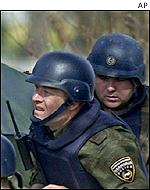 More Macedonian troops have been deployed in Tetovo
I went to other villages near Tetovo, expecting to find opinion divided over the NLA, but instead was surprised to find that everyone I asked said they were prepared to fight.
Despite this, it still appears that those who want an armed struggle are a minority within a minority.
But as so often in the Balkans, once the guns come out, nothing can be taken for granted.
The crucial, unanswered, question, remains how much support the NLA can win among ordinary ethnic Albanians.
The answer will determine whether there are simply more sporadic clashes - or if Macedonia slides towards civil war. Key town under fire. BBC Macedonian troops fire on rebel positions from Tetovo. Tuesday, 20 March, 2001, 14:42 GMT
By Peter Biles in Tetovo
The Macedonian town of Tetovo has seen much of the fighting between government troops and ethnic Albanians, and for much of the day we've heard mortar shells being fired by the Macedonian security forces into the steep hillsides that overlook the town.
Smoke is billowing from one of the wooded areas as the Macedonians try to flush out the ethnic Albanian rebels.
Down on the street, it's pretty much deserted, just the occasional car going past and a few local people peering out from around the corners of buildings.
Away from the gunfire, in a small cafe, I talked to Teseci Jovica, a 36-year-old Macedonian man.
At times, he seemed on the verge of tears, barely able to control his anger as he explained how, because of the fighting, he'd moved his wife and child away from Tetovo to the safety of Skopje.
"My wife and my kids I sent to Skopje because I have a little child... but I must stay because that house is the house of my grand grand father."
Necessary operation
I ask him if he believes the security forces can control the situation?
"Yes, I think, I think, I think ... because I believe in state institution."
Into the volatile and unpredictable atmosphere of Tetovo came the UN special envoy for the Balkans, Carl Bildt.
As the firing and the shelling continued outside, Mr Bildt said it was vital to support Macedonia's democracy and its elected leaders.
"I think it's very important for us to support the institutions of Macedonia. This is a democratic functioning state," he said.
"There's a war going on, but it is primarily the responsibility of the institutions.
"But at the moment, I don't think that there is any reason to enter into dialogue with people who have taken to guns against what is a democracy and what is going on out there as we speak.
"We can hear it, the security operation that is unfortunately necessary and I think it is extremely important that that is conducted with the utmost care," Mr Bildt said.
'Yugoslav disease'
Joining Carl Bildt at a news conference was Arben Xhaferi, the leader of the Democratic Party for Albanians in Macedonia.
"Macedonia suffers from the Yugoslav disease," he said.
"The Albanian problem hasn't been solved anywhere and this is leading to confusion. It's encouraging the radicals. Tragically, the fighting is beginning to tear the Slav and Albanian communities even further apart," Mr Xhaferi said. 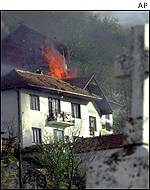 The rebels attack from the hills that overlook Tetovo. Teseci Jovica says that two years ago, Macedonia helped the Kosovo Albanian refugees. But now he feels betrayed by those Albanians who've taken up arms.
"We are not angry at all Albanian people because they are our neighbours, they are in some cases brothers, because they are born here.
"They are also Macedonian like I, and they are also citizens. But they never want to be Macedonian citizens," he says
For now, the Macedonian authorities are having to deal with this crisis alone.
They need help, but it's hard to see where it will come from. |



